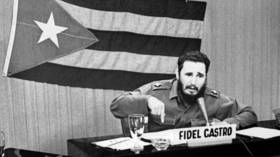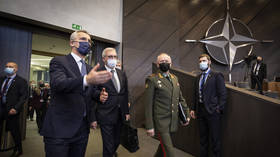Fyodor Lukyanov: How the world sleepwalked into another Cuban Missile Crisis

Towards the end of last year, Russia put forward a number of tough demands, phrased in the form of an ultimatum, to Washington and NATO. The content of two draft treaties offered to the West effectively called for a revision of the system of European security as it existed since the start of the Cold War.
The issue at hand with the growing standoff between Moscow and the US and its European partners is not one of tactics or expedience – rather, it is a matter of principle. However, it is also a matter of principle for the West, since it views the current framework of European security as very favorable and rooted in the values it espouses.
Therefore, the West doesn’t see why it should replace the existing system with something else in order to make Russia happy. So, both sides seem to have taken firm positions on the matter. Unfortunately, stalemates like this one are never resolved through amicable conversation. In times past, it would be settled by war and consequent re-balancing of power. But in modern times, a war between two nuclear-armed nations is essentially out of the question due to the exceptional nature of the risks involved.
As a result, both sides are trying to gain the upper hand by relying on their ‘competitive advantages’.
Russia’s advantage comes from the fact that its military capabilities in the potential zone of conflict are far beyond those of the US and NATO, and that Russia is in a position to apply force should the worst possible scenario be realized. Western nations, on the other hand, emphasize that they would not, under any circumstances, get directly involved in the conflict.
America’s advantage lies in its international dominance over the realm of media and information, including its ability to construct a global narrative favorable to itself and highly unfavorable to Russia: ‘Moscow is a predatory and ruthless aggressor; it is everyone’s duty to oppose Russia; basically, run for your lives before it is too late’. The US is already using this tool to the fullest extent, so much so that it disregards the interests of the country it purports to protect (Ukraine), dismissing its feeble pleas for America to stop whipping up information hysteria.
In reality, no one wants a military solution, as it involves huge risks for all sides. One might like to draw a parallel between the current developments and the Cuban Missile Crisis of 1962, when the world stood on the precipice of atomic war. With certain caveats, of course: There is no direct threat of nuclear confrontation between any of the sides; resources and capabilities of the sides are asymmetrical; the line between real and ‘virtual’ danger has become blurred; and the stakes are regional, which is not to say they are low. Still, in terms of perceived hysteria, the two situations are very much comparable.
The best-case scenario would be the same as during the Cuban Missile Crisis. At some point, both sides would recognize the grave danger posed by further escalation and start direct substantive negotiations in order to work out the fundamentals of mutual guarantees. In 1962, this approach laid the foundation for a new system of relations between the two blocs, one that made the latter half of the Cold War safer, and there was significantly less fear of a direct head-to-head confrontation between the USSR and the US. Today, this would seem the optimal way forward as well.
The statements, views and opinions expressed in this column are solely those of the author and do not necessarily represent those of RT.















